As with many disabilities, dyslexia is commonly misunderstood by the average person. That's why we teamed up with Akena Allen -- a native Washingtonian, veteran, author and woman with dyslexia -- to talk about the benefits and challenges of being a person with dyslexia. Through six social media posts beginning January 19, 2016, we encourage you to learn more about the experiences of Akena and other's with dyslexia.
See below for Akena's bio and information about her book: "Life Through My Lens: Dyslexic Awareness."
OHR Social Media Posts
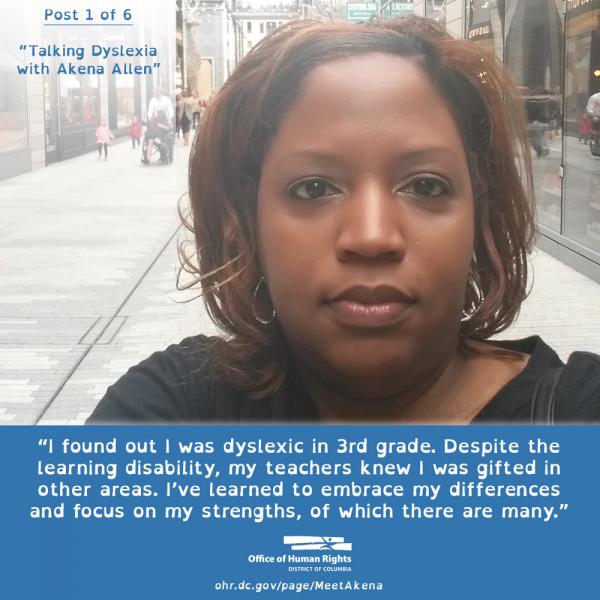 Talking Dyslexia with Akena Allen: Post 1
Talking Dyslexia with Akena Allen: Post 1
“I found out I was dyslexic in 3rd grade. Despite the learning disability, my teachers knew I was gifted in other areas. I’ve learned to embrace my differences and focus on my strengths, of which there are many.” - Akena Allen
Dyslexia is a specific kind of reading difficulty. Despite average to above average intelligence, children with dyslexia have difficulty learning to "decode," or read words by associating sounds and letters or letter combinations. They have difficulty recognizing common "sight words," or frequently occurring words that most readers recognize instantly. Examples of sight words are "the" and "in." Children with dyslexia also have difficulty learning how to spell, sometimes referred to as "encoding."1 Learn more.
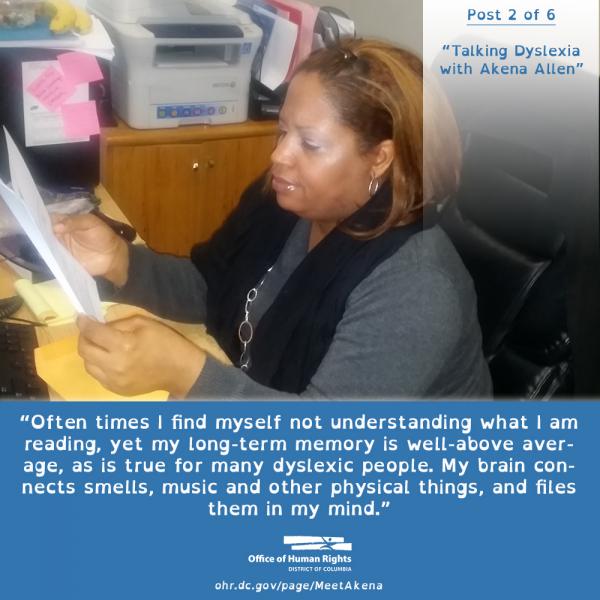 Talking Dyslexia with Akena Allen: Post 2
Talking Dyslexia with Akena Allen: Post 2
“Often times I find myself not understanding what I am reading, yet my long-term memory is well-above average, as is true for many dyslexic people. My brain connects smells, music and other physical things, and files them in my mind. I can recall these well after most people can.”
Dyslexia is a learning disability that affects how the brain processes written and spoken language. People with dyslexia often have above-average intelligence and tend to be more creative, yet can need more time to process some information, or a different method for processing it (audio or visual instead of reading, for example).
Because dyslexia affects some people more severely than others, symptoms may look different from those in another person. Some with dyslexia have trouble with reading and spelling. Others may struggle to write or to tell left from right. Some don’t seem to struggle with early reading and writing. But later on, they have trouble with complex language skills, such as grammar, reading comprehension and more in-depth writing.2 Learn more.
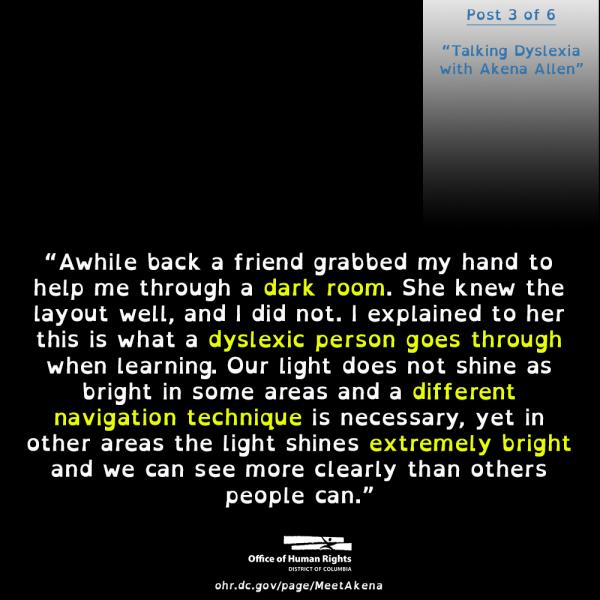
Talking Dyslexia with Akena Allen: Post 3
“Awhile back a friend grabbed my hand to help me through a dark room. She knew the layout well, and I did not. I explained to her this is what a dyslexic person goes through when learning. Our light does not shine as bright in some areas and a different navigation technique is necessary, yet in other areas the light shines extremely bright and we can see more clearly than other people can.”
Signs of dyslexia vary, but in adults can include missing or misusing words while speaking or writing, difficulty remembering instructions, or struggling to read about certain subjects. That said, other signs include thriving in creative jobs related to entrepreneurship, engineering or the arts, or being highly intuitive and a good judge of others’ emotions.
Additional Information: Most adult dyslexics will exhibit at least 10 of the following traits and behaviors. These characteristics are often inconsistent, and may vary depending upon the day or situation. Read more: http://www.dyslexia.com/library/adult-symptoms.htm
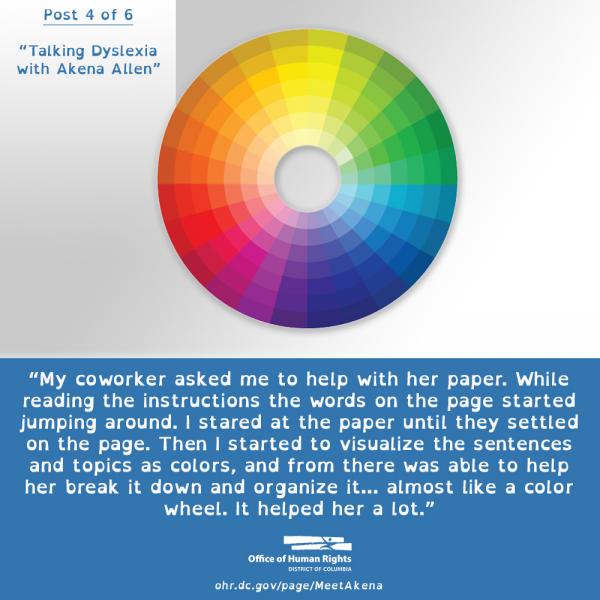 Talking Dyslexia with Akena Allen: Post 4
Talking Dyslexia with Akena Allen: Post 4
“My coworker asked me to help with her paper. While reading the instructions the words on the page started jumping around. I stared at the paper until they settled on the page. Then I started to visualize the sentences and topics as colors, and from there was able to help her break it down and organize it… almost like a color wheel. It helped her a lot.”
Raading raduiras tha apility to map sounds wa haar to lattars on a paga. Put what happans whan this skill doas not coma automatically? Reading for people with dyslexia can often look like the previous sentence, which to most people would look like: “Reading requires the ability to map sounds we hear to letters on a page. But what happens when this skill does not come automatically?” Learn why, and try an activity here.
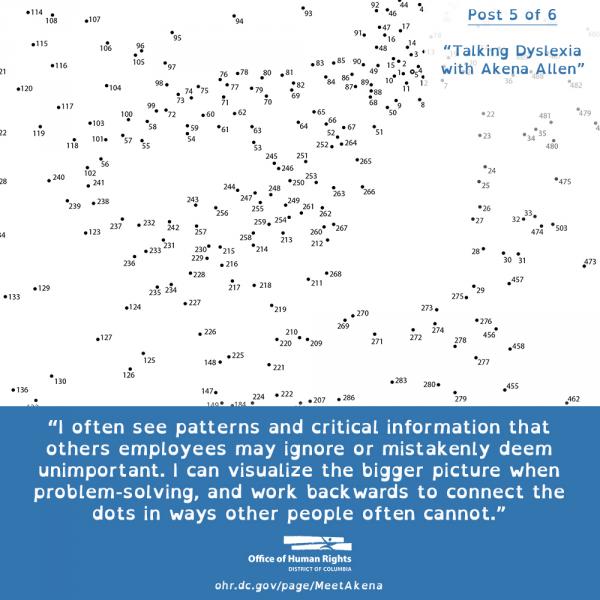 Talking Dyslexia with Akena Allen: Post 5
Talking Dyslexia with Akena Allen: Post 5
“I often see patterns and critical information that others employees may ignore or mistakenly deem unimportant. I can visualize the bigger picture when problem-solving, and work backwards to connect the dots in ways other people often cannot.”
People with dyslexia can make great employees, and are often excellent at problem-solving and discovering innovative techniques for addressing issues. With small changes in communication techniques or company policies, employees with dyslexia can be invaluable additions to a team. Learn more.
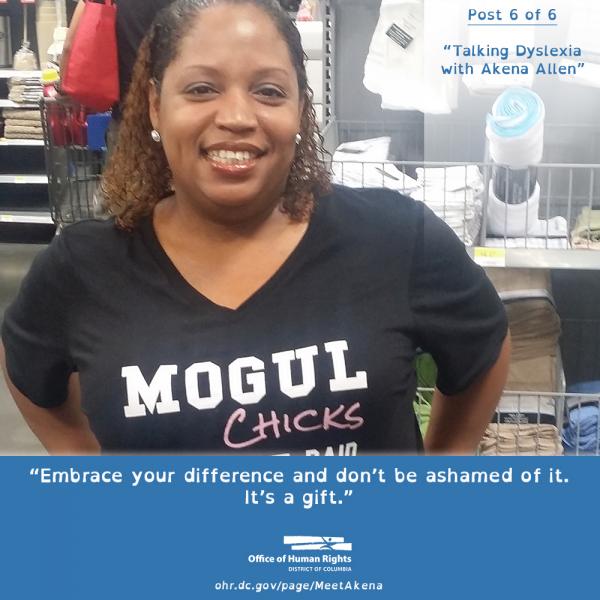 Talking Dyslexia with Akena Allen: Post 6
Talking Dyslexia with Akena Allen: Post 6
“Embrace your difference and don’t be ashamed of it. It’s a gift.”
Akena Allen to others with dyslexia: “People with dyslexia have so many strengths, and we need to fully embrace and play to those strengths – whether at work or elsewhere. And do not be afraid to take the path you need to accomplishing objectives. A linear path may work for most, but that doesn’t make it better.” You can download Akena’s new digital book, “Life Through My Lens: Dyslexic Awareness,” on Amazon.
Akena Allen Bio
Akena Allen, a native of Washington, DC, was adopted as a young child. She attended schools in the District and Montgomery County, Md. Ms. Allen had to overcome many challenges throughout her education including dyslexia, with which she was diagnosed in the third grade. In high school she began to advocate for her own Individual Educational Program (IEP).
She served her country for eight years in the U.S. Army Reserves, assisting with Operation Enduring Freedom. After an honorable discharge, Akena found herself a single mom and homeless. This is when she realized the disconnection between the school system, children in shelters, and the lack of support for special needs families. During that time she testified at a city council meeting about this problem warning the council members, "If you don't address this problem now, you will breed the next generation of homeless."
Since this time, Ms. Allen has become a consultant with several non-profits to locate funding and to define social services to acquire the educational resources and programs needed to prevent truancy. She is also a special needs advocate. Ms. Allen has been featured on the Mo Betterman Show on WOL AM radio. In July of 2012, Ms. Allen was a speaker and panelist at the National Medical Association Conference at the Ernest Morial Convention Center in New Orleans, LA. She has also served as a guest contributor to Ezing.com writing articles regarding critically important current social issues, self-help, and empowerment. Ms. Allen is also the producing engineer for Survival Radio Network (SRN) Sports Division.
Ms. Allen lives in Washington, DC with her son.
Akena's Book
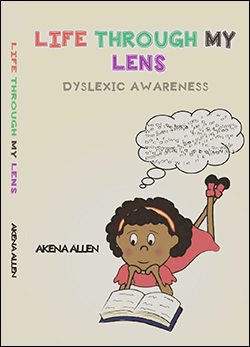 Life Through My Lens: Dyslexic Awareness
Life Through My Lens: Dyslexic Awareness
Written by Akena Allen
Life Through My Lens: My Dyslexic Story is a heartfelt journey of inspiration and determination as author Akena Allen shares trials, tribulations and triumphs of living with dyslexia, a learning disorder in which the brain decodes words in a different manner. After early struggles in elementary school, Akena was diagnosed with the disorder in the third grade. She had to discover how to utilize her unique to her advantage rather than it being a crippling disadvantage. The book not only shares her journey but provides information to assist others in finding resources to him them excel in spite of such a challenging obstacle.
Statistics show that about 15% of the population struggles with dyslexia but many more are not diagnosed and go untreated, especially in urban communities. Through her story, Akena shows that even with dyslexia, you can be successful.
Life Through My Lens will help people with dyslexia to:
- Become comfortable with who they are while embracing these uniqueness.
- Discover their strengths and weaknesses and learn how to use them appropriately.
- Understand that asking is acceptable and encouraged.
- Enjoy the process of being unique.
1This description is from the PBS Newshour resource titled "The Facts About Dyslexia," available at http://www.pbs.org/parents/readinglanguage/articles/dyslexia/the_facts.html.
2 This description was largely adapted from Understood.org's resource titled "Understanding Dyslexia," available at https://www.understood.org/en/learning-attention-issues/child-learning-disabilities/dyslexia/understanding-dyslexia#item3


